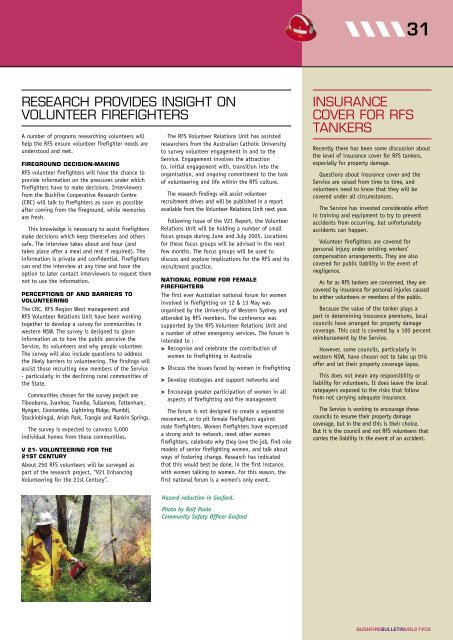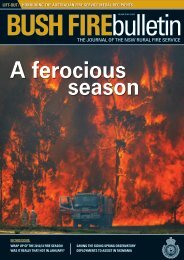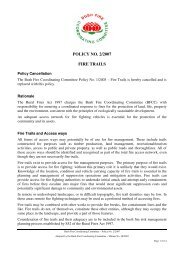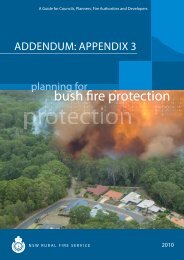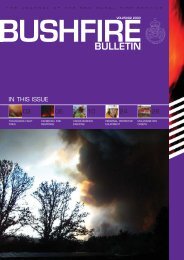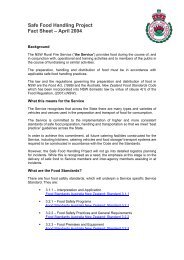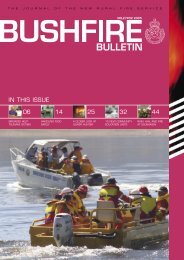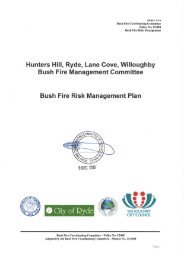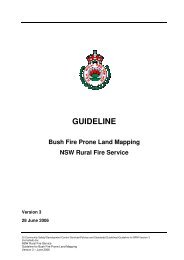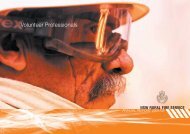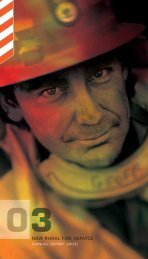to view - NSW Rural Fire Service
to view - NSW Rural Fire Service
to view - NSW Rural Fire Service
Create successful ePaper yourself
Turn your PDF publications into a flip-book with our unique Google optimized e-Paper software.
31<br />
RESEARCH PROVIDES INSIGHT ON<br />
VOLUNTEER FIREFIGHTERS<br />
A number of programs researching volunteers will<br />
help the RFS ensure volunteer firefighter needs are<br />
unders<strong>to</strong>od and met.<br />
FIREGROUND DECISION-MAKING<br />
RFS volunteer firefighters will have the chance <strong>to</strong><br />
provide information on the pressures under which<br />
firefighters have <strong>to</strong> make decisions. Inter<strong>view</strong>ers<br />
from the Bushfire Cooperative Research Centre<br />
(CRC) will talk <strong>to</strong> firefighters as soon as possible<br />
after coming from the fireground, while memories<br />
are fresh.<br />
This knowledge is necessary <strong>to</strong> assist firefighters<br />
make decisions which keep themselves and others<br />
safe. The inter<strong>view</strong> takes about and hour (and<br />
takes place after a meal and rest if required). The<br />
information is private and confidential. <strong>Fire</strong>fighters<br />
can end the inter<strong>view</strong> at any time and have the<br />
option <strong>to</strong> later contact inter<strong>view</strong>ers <strong>to</strong> request them<br />
not <strong>to</strong> use the information.<br />
PERCEPTIONS OF AND BARRIERS TO<br />
VOLUNTEERING<br />
The CRC, RFS Region West management and<br />
RFS Volunteer Relations Unit have been working<br />
<strong>to</strong>gether <strong>to</strong> develop a survey for communities in<br />
western <strong>NSW</strong>. The survey is designed <strong>to</strong> glean<br />
information as <strong>to</strong> how the public perceive the<br />
<strong>Service</strong>, its volunteers and why people volunteer.<br />
The survey will also include questions <strong>to</strong> address<br />
the likely barriers <strong>to</strong> volunteering. The findings will<br />
assist those recruiting new members of the <strong>Service</strong><br />
- particularly in the declining rural communities of<br />
the State.<br />
Communities chosen for the survey project are<br />
Tibooburra, Ivanhoe, Trundle, Tullamore, Tottenham,<br />
Nyngan, Coonamble, Lightning Ridge, Mumbil,<br />
S<strong>to</strong>ckinbingal, Ariah Park, Trangie and Rankin Springs.<br />
The survey is expected <strong>to</strong> canvass 5,000<br />
individual homes from these communities.<br />
V 21- VOLUNTEERING FOR THE<br />
21ST CENTURY<br />
About 250 RFS volunteers will be surveyed as<br />
part of the research project, “V21 Enhancing<br />
Volunteering for the 21st Century”.<br />
The RFS Volunteer Relations Unit has assisted<br />
researchers from the Australian Catholic University<br />
<strong>to</strong> survey volunteer engagement in and <strong>to</strong> the<br />
<strong>Service</strong>. Engagement involves the attraction<br />
<strong>to</strong>, initial engagement with, transition in<strong>to</strong> the<br />
organisation, and ongoing commitment <strong>to</strong> the task<br />
of volunteering and life within the RFS culture.<br />
The research findings will assist volunteer<br />
recruitment drives and will be published in a report<br />
available from the Volunteer Relations Unit next year.<br />
Following issue of the V21 Report, the Volunteer<br />
Relations Unit will be holding a number of small<br />
focus groups during June and July 2005. Locations<br />
for these focus groups will be advised in the next<br />
few months. The focus groups will be used <strong>to</strong><br />
discuss and explore implications for the RFS and its<br />
recruitment practice.<br />
NATIONAL FORUM FOR FEMALE<br />
FIREFIGHTERS<br />
The first ever Australian national forum for women<br />
involved in firefighting on 12 & 13 May was<br />
organised by the University of Western Sydney and<br />
attended by RFS members. The conference was<br />
supported by the RFS Volunteer Relations Unit and<br />
a number of other emergency services. The forum is<br />
intended <strong>to</strong> :<br />
> Recognise and celebrate the contribution of<br />
women <strong>to</strong> firefighting in Australia<br />
> Discuss the issues faced by women in firefighting<br />
> Develop strategies and support networks and<br />
> Encourage greater participation of women in all<br />
aspects of firefighting and fire management<br />
The forum is not designed <strong>to</strong> create a separatist<br />
movement, or <strong>to</strong> pit female firefighters against<br />
male firefighters. Women firefighters have expressed<br />
a strong wish <strong>to</strong> network, meet other women<br />
firefighters, celebrate why they love the job, find role<br />
models of senior firefighting women, and talk about<br />
ways of fostering change. Research has indicated<br />
that this would best be done, in the first instance,<br />
with women talking <strong>to</strong> women. For this reason, the<br />
first national forum is a women’s only event.<br />
INSURANCE<br />
COVER FOR RFS<br />
TANKERS<br />
Recently there has been some discussion about<br />
the level of insurance cover for RFS tankers,<br />
especially for property damage.<br />
Questions about insurance cover and the<br />
<strong>Service</strong> are raised from time <strong>to</strong> time, and<br />
volunteers need <strong>to</strong> know that they will be<br />
covered under all circumstances.<br />
The <strong>Service</strong> has invested considerable effort<br />
in training and equipment <strong>to</strong> try <strong>to</strong> prevent<br />
accidents from occurring, but unfortunately<br />
accidents can happen.<br />
Volunteer firefighters are covered for<br />
personal injury under existing workers’<br />
compensation arrangements. They are also<br />
covered for public liability in the event of<br />
negligence.<br />
As far as RFS tankers are concerned, they are<br />
covered by insurance for personal injuries caused<br />
<strong>to</strong> either volunteers or members of the public.<br />
Because the value of the tanker plays a<br />
part in determining insurance premiums, local<br />
councils have arranged for property damage<br />
coverage. This cost is covered by a 100 percent<br />
reimbursement by the <strong>Service</strong>.<br />
However, some councils, particularly in<br />
western <strong>NSW</strong>, have chosen not <strong>to</strong> take up this<br />
offer and let their property coverage lapse.<br />
This does not mean any responsibility or<br />
liability for volunteers. It does leave the local<br />
ratepayers exposed <strong>to</strong> the risks that follow<br />
from not carrying adequate insurance.<br />
The <strong>Service</strong> is working <strong>to</strong> encourage these<br />
councils <strong>to</strong> resume their property damage<br />
coverage, but in the end this is their choice.<br />
But it is the council and not RFS volunteers that<br />
carries the liability in the event of an accident.<br />
Hazard reduction in Gosford.<br />
Pho<strong>to</strong> by Rolf Poole<br />
Community Safety Officer Gosford<br />
BUSHFIREBULLETINVOL27#02


